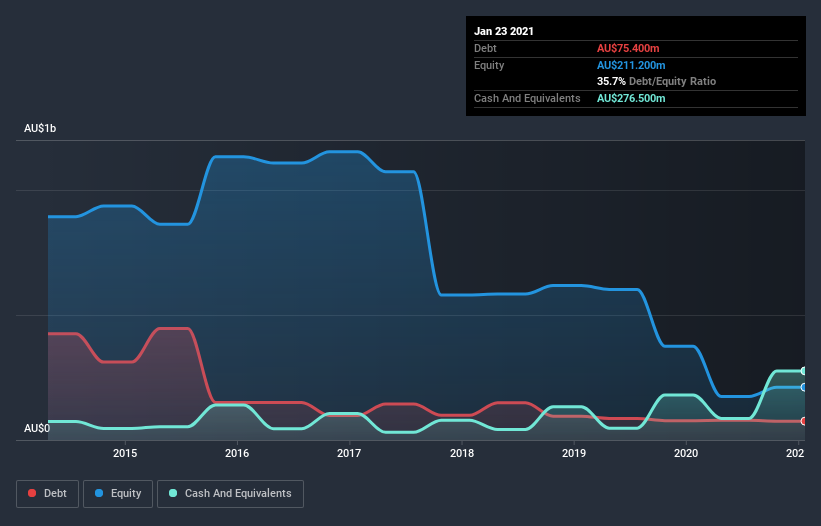These 4 Measures Indicate That Myer Holdings (ASX:MYR) Is Using Debt Extensively

David Iben put it well when he said, 'Volatility is not a risk we care about. What we care about is avoiding the permanent loss of capital.' So it seems the smart money knows that debt - which is usually involved in bankruptcies - is a very important factor, when you assess how risky a company is. We can see that Myer Holdings Limited (ASX:MYR) does use debt in its business. But is this debt a concern to shareholders?
Why Does Debt Bring Risk?
Debt and other liabilities become risky for a business when it cannot easily fulfill those obligations, either with free cash flow or by raising capital at an attractive price. In the worst case scenario, a company can go bankrupt if it cannot pay its creditors. However, a more usual (but still expensive) situation is where a company must dilute shareholders at a cheap share price simply to get debt under control. Of course, plenty of companies use debt to fund growth, without any negative consequences. The first step when considering a company's debt levels is to consider its cash and debt together.
View our latest analysis for Myer Holdings
What Is Myer Holdings's Debt?
As you can see below, Myer Holdings had AU$75.4m of debt, at January 2021, which is about the same as the year before. You can click the chart for greater detail. However, it does have AU$276.5m in cash offsetting this, leading to net cash of AU$201.1m.

A Look At Myer Holdings' Liabilities
Zooming in on the latest balance sheet data, we can see that Myer Holdings had liabilities of AU$676.8m due within 12 months and liabilities of AU$1.68b due beyond that. Offsetting these obligations, it had cash of AU$276.5m as well as receivables valued at AU$28.8m due within 12 months. So it has liabilities totalling AU$2.05b more than its cash and near-term receivables, combined.
This deficit casts a shadow over the AU$233.4m company, like a colossus towering over mere mortals. So we definitely think shareholders need to watch this one closely. After all, Myer Holdings would likely require a major re-capitalisation if it had to pay its creditors today. Myer Holdings boasts net cash, so it's fair to say it does not have a heavy debt load, even if it does have very significant liabilities, in total.
Importantly, Myer Holdings's EBIT fell a jaw-dropping 30% in the last twelve months. If that decline continues then paying off debt will be harder than selling foie gras at a vegan convention. When analysing debt levels, the balance sheet is the obvious place to start. But it is future earnings, more than anything, that will determine Myer Holdings's ability to maintain a healthy balance sheet going forward. So if you're focused on the future you can check out this free report showing analyst profit forecasts.
Finally, a company can only pay off debt with cold hard cash, not accounting profits. While Myer Holdings has net cash on its balance sheet, it's still worth taking a look at its ability to convert earnings before interest and tax (EBIT) to free cash flow, to help us understand how quickly it is building (or eroding) that cash balance. Happily for any shareholders, Myer Holdings actually produced more free cash flow than EBIT over the last three years. That sort of strong cash conversion gets us as excited as the crowd when the beat drops at a Daft Punk concert.
Summing up
Although Myer Holdings's balance sheet isn't particularly strong, due to the total liabilities, it is clearly positive to see that it has net cash of AU$201.1m. And it impressed us with free cash flow of AU$192m, being 164% of its EBIT. Despite the cash, we do find Myer Holdings's level of total liabilities concerning, so we're not particularly comfortable with the stock. When analysing debt levels, the balance sheet is the obvious place to start. However, not all investment risk resides within the balance sheet - far from it. For instance, we've identified 1 warning sign for Myer Holdings that you should be aware of.
If you're interested in investing in businesses that can grow profits without the burden of debt, then check out this free list of growing businesses that have net cash on the balance sheet.
If you decide to trade Myer Holdings, use the lowest-cost* platform that is rated #1 Overall by Barron’s, Interactive Brokers. Trade stocks, options, futures, forex, bonds and funds on 135 markets, all from a single integrated account. Promoted
New: Manage All Your Stock Portfolios in One Place
We've created the ultimate portfolio companion for stock investors, and it's free.
• Connect an unlimited number of Portfolios and see your total in one currency
• Be alerted to new Warning Signs or Risks via email or mobile
• Track the Fair Value of your stocks
This article by Simply Wall St is general in nature. It does not constitute a recommendation to buy or sell any stock, and does not take account of your objectives, or your financial situation. We aim to bring you long-term focused analysis driven by fundamental data. Note that our analysis may not factor in the latest price-sensitive company announcements or qualitative material. Simply Wall St has no position in any stocks mentioned.
*Interactive Brokers Rated Lowest Cost Broker by StockBrokers.com Annual Online Review 2020
Have feedback on this article? Concerned about the content? Get in touch with us directly. Alternatively, email editorial-team (at) simplywallst.com.
About ASX:MYR
Myer Holdings
Engages in the operation of department stores under the Myer brand name in Australia.
Second-rate dividend payer with questionable track record.


